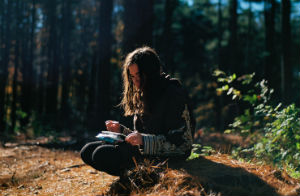Write Outside
Spring is here and my thoughts have centered on outdoor activities. Among these are hikes in the woods, planting in my garden and taking my writing outside. Outdoors isn’t the first place most writers consider working but writing outdoors has many benefits (and a few challenges).
A writer’s place
Ideas of a writer’s space often involve a small room, a desk and chair, maybe a window. You’ve likely seen photographs of famous authors’ spaces, each different only in the number of books and cats present.  Too often, we writers lock ourselves into these spaces, forgetting our writing began out in the world.
Too often, we writers lock ourselves into these spaces, forgetting our writing began out in the world.
Looking back over my years as a writer, many of my fondest memories of writing took place outdoors. In my younger years, I furiously wrote a poem at the edge of a parking lot during a rainstorm. I penned a powerful story on the rocky banks of the Missouri River. I rewrote the opening chapter of my novel sitting in the grasses on Menninger hill. Each of these locations provided fuel for my creativity and offered few distractions.
Nature writing versus writing in nature
“Art takes nature as its model.” -Aristotle
 When you hear the phrase “writing in nature,” you may immediately think of “nature writing,” i.e. writing about nature. (For an excellent exploration of Nature Writing see Lissa Staley’s post.) While writing outside can certainly bring about strong imagery from nature, it does not require it. In fact, writing outside can take place in a city landscape as easily as it does on a hillside. The key is finding a spot where air can circulate, the sun may occasionally shine and where there are few distractions.
When you hear the phrase “writing in nature,” you may immediately think of “nature writing,” i.e. writing about nature. (For an excellent exploration of Nature Writing see Lissa Staley’s post.) While writing outside can certainly bring about strong imagery from nature, it does not require it. In fact, writing outside can take place in a city landscape as easily as it does on a hillside. The key is finding a spot where air can circulate, the sun may occasionally shine and where there are few distractions.Taking it outdoors
It’s easy to grab pen and paper, take your ideas and head outdoors. Spontaneity is a great thing. If you find yourself in the perfect setting, go for it. It’s frustrating to be in the groove, however, and have to stop because you’re hungry or because you’re too uncomfortable to continue. With this in mind, I recommend a little planning.
- Seating. Plopping down on a rock or a grassy mound may work for some of us, but it’s not for everyone. If you know you’ll be shifting uncomfortably the whole time, bring along a lightweight, comfortable lawn chair.
- Snacks. We may think of ourselves as starving artists with no reliance on food, but when hunger pangs hit, creativity suffers. Remember to pack a few snacks. Granola bars, trail mix and fruit are excellent choices. Just remember to take your trash with you when you leave.
- Prepare for sun. This is the one that usually sends me home early. The sun’s rays can be unrelenting, so remember to put on sunscreen and to hydrate.

- Prepare for wind. While editing the 500 loose pages of my manuscript, I truly learned how annoying wind can be for a writer. I never lost a sheet to the wind, but the battle was exhausting. Avoid this frustration by bringing along a closeable binder or a reliable clip.
- Pen and paper. If this old-school method is not a possibility for you, consider a tape recorder. The point is to keep distraction and technology out of the picture as much as possible. If you must take your laptop, turn off your internet, disable all unnecessary features, and make sure your battery is fully charged (it may be difficult to find a charging station in the neighboring forest).
Bring it home
Once you begin looking for them, you’ll find dozens of excellent places to write: parks, lakes, trails, even your own backyard. There’s nothing magical about the location you choose, but there’s something about the setting that can really charge your writing. Spend a couple hours letting the landscape fuel your creativity and notice how the writing in your everyday writer’s space changes.













